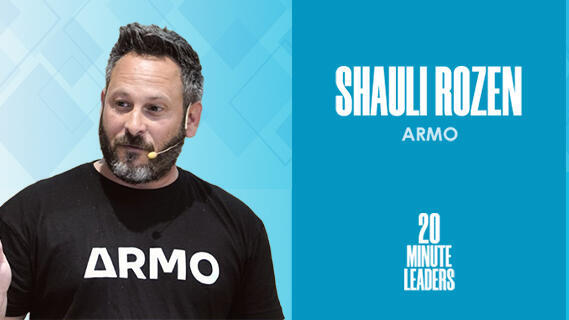
20-Minute Leaders
“I have always been looking to diversify and do and learn new things.”
As the co-founder and CEO of ARMO, Shauli Rozen says the way you hear from customers may change, but listening to them is key.
Though getting automated user feedback and data can be useful, Shauli Rozen believes it is still critical to speak to customers and users when building a product. Now the co-founder and CEO of ARMO, he says the way you hear from customers may change, but listening to them is key. Rozen explains that as he’s branched out from engineering, he’s learned to think like a user. He says many engineers design products thinking like a developer, not a customer. He sees product-led growth as a way to get users to fall in love with a product through more engagement. ARMO is using PLG to build a Kubernetes security platform for DevOps. Rozen says that DevOps is an important junction for everything going on in a company. His career is marked by a desire to learn new things, and he shares that building an open-source community has become a new passion.
Click Here For More 20MinuteLeaders
You have such a fascinating background: Ben Gurion, Wharton MBA, Boston Consulting Group, director of product strategy at Amdocs, chief strategy officer and general manager at Optimove, and then entrepreneur and CEO of ARMO. What connects the dots throughout all these different experiences?
It's interesting that I ended up where I should have started. Very honestly, it was just that one thing led to another. I ended up where I am a little bit by chance. Every step I made from one point to another made sense at that point. I was always looking to diversify and do and learn new things. It's usually chance and then your ability to act on it.
What is ARMO? What problem are you trying to solve?
What we are trying to establish is the first end-to-end open-source Kubernetes security built for developers and built for DevOps. We knew we wanted to solve Kubernetes security problems. It was clear that there is a big shift that is happening in the market where DevOps, specifically, gets more and more security responsibility. We knew we needed to create a solution which is built for developers and for DevOps. So if you're looking at DevOps, what's the best way to go about it? Open source came into mind and doing a bottom-up approach where the tool is built for developers and they can try it. So if the tool is good, if it's working well, that's what we are going to go after. I used to do B2B sales: go to the meeting, put your suit on, add a tie. It is refreshing to have your product sell for you and to have buyers who are actually very straightforward.
Going back to understanding consumer behavior and the role developers are playing within organizations, how did your previous background impact that?
I always say that I'm an engineer turned businessman turned entrepreneur. I think that psyche is what gives me the opportunity to have a good view of what's happening here. What works very well for me that probably wouldn't if I were only an engineer is thinking like a user. One of the things that I learned in Optimove, a marketing company, was you are not building a product for yourself. Even engineers, many times when they create a product for engineers, they think not as a consumer but as the developer of the product. Putting the mindset of the customer and user into play is a huge advantage for any company.
Walk me through the development life cycle of a company today with ARMO. What does ARMO tangibly do?
Usually, the way we get into the company is via a DevOps engineer or leader that cares about security. They do care about security; they just think about it as engineers. They want to build stuff. Usually, they get into our GitHub page and they see a project that can help them actually find issues in their development process and in their clusters without adding a lot of burden. We pride ourselves on the ability to show you your first results and give you value three minutes after you started working with us.
They take the tool, they install it, they run it once, they get a report. Then the idea is to show them very quickly their value and then increase their engagement with our platform through more and more functionality. You see what's wrong in your cluster, and then you say, "Maybe I should also see how the vulnerabilities in my cluster connect to those configuration issues that I found." You go into our SaaS version, and you find it there. Then we bring those two together.
This is speaking to the shift of responsibility for developers and agency the developers have today in bringing in new products and ensuring the healthy life cycle of a company. What's been happening to developer agency within organizations and how critical is that for ARMO?
DevOps are becoming a very key junction for everything that is happening in the company. They basically operate the data center of the company. You see even financial responsibility going into DevOps with FinOps; you see security going into DevOps. One of the biggest problems that they face is that they are experts in development and operations, but they are not experts in finance or security sometimes. The magic that those tools bring to them is you can serve the security function without being a security expert. The challenge that we have, as people who create tools for those users, is to help them bridge that gap, to help them become a security expert without being a security expert. They start to manage different functions, sometimes even logistic functions.
How do you see product-led growth as a core part of ARMO?
Product led-growth is basically a building or product development methodology that helps you build the product that users love. You keep testing and using data to put in the functionality that users prefer and that gives them the most value. Product-led growth is just a way or methodology to continuously create engagement with the product and get more users in love with your product. That's what we are getting. It's not only in usage, but when people start to tweet about your product and you have unsolicited content. That's what you want to get when you do product-led growth.
I think that being an extremist is never the right choice. Even in product-led growth, it's not that you don't use sales or customer support. Some people say, "Everything should be automated. Your product is going to learn and change." I don't do just that. I speak with my customers. I give them calls. If I see someone who is using the product a lot, I set up time with them. I learn what they love about the product. Don't confuse PLG with, "Everything is going to be automated. I'm not going to speak with the customers.”
I think that a lot of the dangers of these terms is that it creates a lot of hype and it allows people to think that they can isolate themselves from other strategies. Have you noticed some other non-trivial behaviors when it comes to product led-growth or any strategy for the development life cycle of a product?
I think there are not many ultimate truths in the world. But one ultimate truth that I still stick with is "you can't develop anything without customer feedback or without user feedback." You can automate user feedback. You can put trackers in your product to see where the users spend most of their time and use that. I still believe that speaking with the customers and users is a key part of building any product. The channel may change, but the concept of speaking with the users, listening to users, should be the main focus of any company developing any product.
I want to end on a different note. Where does your passion lie?
I started with being an engineer and doing the circle where I now built a product that is very engineering-driven. That's where my passion started. But in the last year, I think one of the major changes that I'm going through is this open-source notion and the power of open source, the power of the community. It's exciting to build a community. The level of creativity that you can get when you have a community and actually managing that community is something which is really refreshing. There is a generation change in the world. Those new decision makers, new powerhouses of people, capabilities, knowledge, and innovation, they are so unique. That's, for me, the most exciting thing.
Michael Matias, Forbes 30 Under 30, is the author of Age is Only an Int: Lessons I Learned as a Young Entrepreneur. He studies Artificial Intelligence at Stanford University, is a Venture Partner at J-Ventures and was an engineer at Hippo Insurance. Matias previously served as an officer in the 8200 unit. 20MinuteLeaders is a tech entrepreneurship interview series featuring one-on-one interviews with fascinating founders, innovators and thought leaders sharing their journeys and experiences.
Contributing editors: Michael Matias, Megan Ryan
